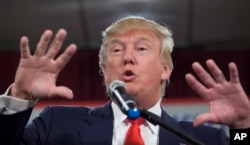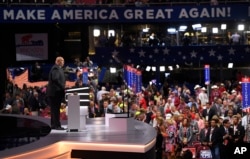The unlikeliest supporters of a once-unlikely candidate had their moment in the spotlight Tuesday night, as Sajid Tarar, the founder and leader of a group calling itself Muslims for Trump led a blessing at the Republican National Convention.
“Let us pray again to get our country back,” Tarar told convention delegates hours after Donald Trump officially secured the Republican presidential nomination.
Some delegates held their hands up in prayer as Tarar invoked the Prophet Muhammad to ask God to bless Donald Trump and bring the United States a strong leader. Tarar’s group says Donald Trump is revealing harsh truths about immigration and terrorism, speaking to the Muslim community in a way no one else can.
The moment was an unusual milestone in a campaign marked by Trump’s controversial comments about the threat of terrorism and Muslim immigration.
Trump has said that "Islam hates us" and has proposed that authorities monitor U.S. mosques and register Muslims in a national database.
“I will suspend immigration from areas of the world where there is a proven history of terrorism against the United States, Europe or our allies until we fully understand how to end these threats,” Trump said after a gunman who called himself an Islamic soldier killed dozens at a gay nightclub in Orlando, Florida, last month.
Trump also criticized his Democratic opponent Hillary Clinton following that shooting.
"If Hillary Clinton, after this attack, still cannot say the two words 'radical Islam,' she should get out of this race for the presidency,” Trump said. Clinton maintains it is more accurate to speak of "radical Islamism," depicting an ideological rather than a religion.
While Trump has often made controversial statements about terrorism and Muslim immigration, he has also made clear he does not believe all Muslims are terrorists. He told Fox News in an interview earlier this year, “You’ve got fabulous Muslims. I know many Muslims. They’re fabulous people. They’re smart. They’re industrious. They’re great.”
The use of the phrase “radical Islam” is just one of the issues that attracts Tarar – and others in the group Muslims for Trump – to the Republican’s candidacy.
“The safety of America is No. 1 priority for Donald Trump, and as a Muslim-American, it’s my No. 1 priority as well,” Tarar told VOA earlier this month.
Republican outreach
Tarar says the Trump campaign and the Republican National Committee have welcomed Muslims for Trump and is seeking ways to work with the group in the general election.
Muslims for Trump is connected to the National Diversity Coalition for Trump, an organization that met with representatives from the RNC in early July to discuss outreach to minority voters in November.
Tarar is vague when asked about the size of the group and and acknowledges that Muslims have been less welcoming of the organization. Muslims for Trump appears not to have a dedicated website and has been "liked" by only about 550 people on its Facebook page.
Tarar, a Pakistani-born U.S. citizen, has pushed back against accusations he’s a traitor and accepting money from Trump in return for his support.
“I say [to those critics] 'Look, you are a victim yourself – you are being killed, your relatives are being killed, your kids are getting killed – and this is not what Islam is about,' ” Tarar told VOA. He argues that perceptions of the Republican Party have not caught up to reality.
Tip the balance?
Tarar told VOA he thinks increasing numbers of Muslim-Americans will consider voting for Trump as they learn more about the details of his proposals and connect those policies to their own sense of personal safety.
But a February 2016 survey of 2000 Muslim-American voters by the Council on Islamic-American Relations shows there’s much ground to be made up.
Two-thirds of voters surveyed said they supported the Democratic party, with anywhere from 15 to 18 percent of voters voicing support for the Republican Party. Only 11 percent of those surveyed said they support Trump.
Robert McCaw, director of government affairs at CAIR, said that makes sense since many Muslim-American Republican voters will always support their party’s nominee. But on an anecdotal level, he says he thinks support for Trump does not run deeply in the community.
“In the hundreds or thousands of Muslims I’ve met, I only met several Trump supporters or at least public supporters,” McCaw said. “There might be a few closeted Trump supporters, you never know.”
Since 2012, the number of Muslims registered to vote in the United States has doubled. While their numbers account for only a small part of the American electorate, their presence in a few pivotal states could make a difference in the November election.
McCaw says their surveys found high concentrations of mosques in Ohio, Florida and Virginia, all "swing" states that could determine the eventual winner.
“That bodes well for the community’s ability to tip the election,” he said.
Tarar says it makes sense for the Muslim-American community to vote Republican this year.
“We are fundamentally Republicans because we come from conservative countries with conservative values,” he said.
“Now that Donald Trump is trying to explain in more detail what the ban on [admission of some Muslims] means and what the exceptions are, definitely I’m hopeful that Muslims will join him.”
It's a hope that has yet to be born out by the numbers.

